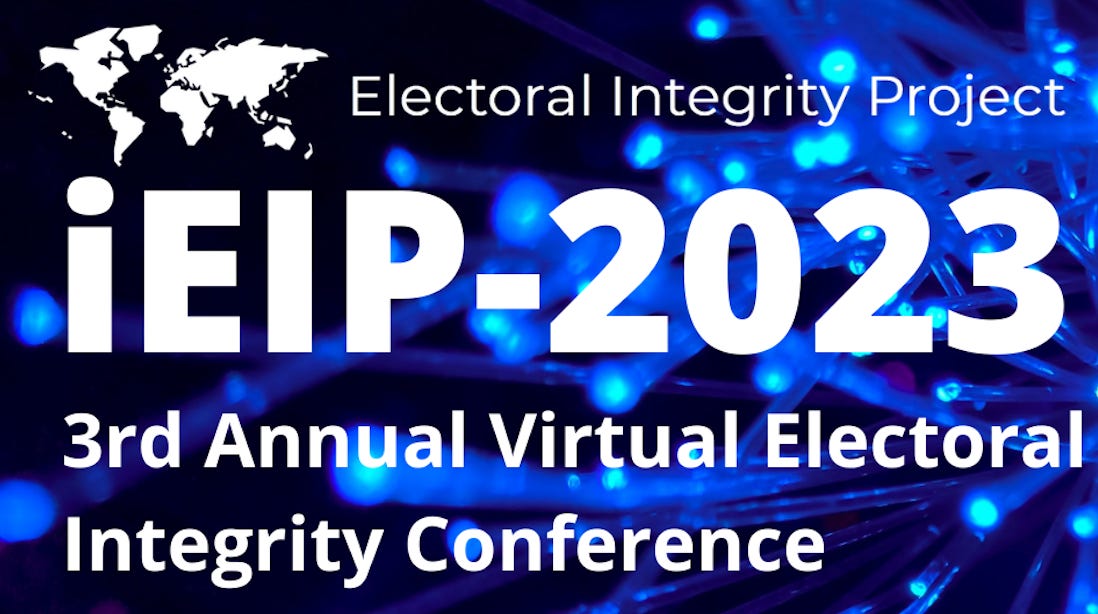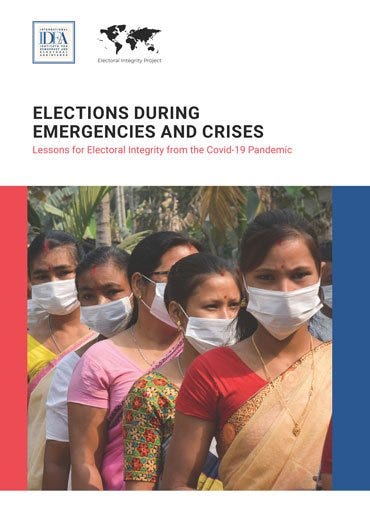EIP Spring Newsletter
conference registration; book release; news from our partners; recent publications
Register for iEIP-2023
Registration to attend the EIP’s 3rd annual virtual conference is open! Convened by EIP directors Dr. Holly Ann Garnett, Prof. Toby S. James, and advisory board member Dr. Masaaki Higashijima, and co-sponsored by the Carter Center, IFES, and International IDEA, this conference includes cutting-edge research on Voter ID laws in the UK, lessons from the pandemic, electoral management, voter confidence, and more. In addition, three panels convened by our partners will provide the opportunity for experts in the field to weigh in on the most relevant challenges facing practitioners (and democracy) today. You can find more information, including a detailed preliminary program, on the conference website. Any questions can be mailed to electoralintegrity@gmail.com.
New Book – Elections During Emergencies and Crises: Lessons for Electoral Integrity from the Covid-19 Pandemic
Elections often have to be held in emergency situations. The Covid-19 pandemic was one of the most serious emergency situations that the world has seen. The rapid spread of the virus presented a huge humanitarian threat—but also an unparalleled challenge to electoral stakeholders globally seeking to protect electoral integrity during times of uncertainty.
The Electoral Integrity Project partnered with International IDEA and researchers around world throughout the pandemic to produce materials in real time to enable lesson learning. We are delighted to announce the publication of a new volume which brings together these materials — alongside fresh comparative analysis to learn the lessons for future emergencies.
This volume identifies how the pandemic affected electoral integrity, and brings together a comprehensive set of 26 country case studies to explore how elections were affected on the ground, what measures were put in place, and what worked in defending them. These case studies are of elections which took place in the eye of the storm when practitioners and policymakers were operating under uncertainty and without the benefit of hindsight.
To learn lessons in a more systematic way, this volume also provides a thematic analysis of electoral integrity during the pandemic using cross-national studies. This provides the big picture for policymakers, practitioners, and academics looking back at the crisis. The volume therefore seeks to contribute towards the future development of policy and practice. However, it does so by using academic research methods and concepts which enable greater confidence in the policy lessons, as well as contributing directly to the scholarship on democracy, democratization and elections. The volume includes 11 areas of recommendation based on the evidence collected in this volume to protect electoral integrity in any future emergency situation.
EIP Fellows 2023
After five successful meetings, the 2023 Fellows met for their last seminar on May 19th. We would once again like to thank Alistair Clark, Gabriela Tarouco, Daniela Donno, and Bridgett King for chairing these seminars! We would also like to thank the fellows for their insightful, diverse, and thorough research and look forward to seeing some of them present at the iEIP conference in July (see preliminary program).
From Our Partners
International IDEA: Protecting Elections – An Integrated Framework
International IDEA has received a grant from the Government of Canada to implement a three-years Protecting Elections Project. The project is inspired by the Institute’s work on electoral risk management, democracy resilience, and the conduct of elections during emergencies and crises. At the end of the project, the Institute will deliver an Integrated Framework for Protecting Elections as a global public good. This Framework will combine several related and gender-sensitive resources, including a guide for practitioners, an assessment tool, a training curriculum and toolbox that consolidates remedies for addressing challenges to electoral integrity.
As a first project milestone, a Protecting Election Expert Group Meeting was organized in March this year; bringing together 26 representatives of electoral management bodies (EMBs), international organizations, and academia. Some important take-aways include:
Having formalized and systematic risk management practices is crucial, although these practices should be adjusted to local contexts and remain flexible.
There are different ways in which EMBs exhibit resilience, but some common elements include the need for EMBs to be agile and transparent, have sufficient funding, a strong mandate and have flexible legal framework and procedures.
The crises EMBs may face are multileveled and include everything from natural disasters and pandemics to technological failure and political crises. Some important features of electoral crisis management are crisis leadership, coordination, and communication. It is likewise key to ensure that EMBs are trusted, engaged, active, and proactive in the community.
Finally, a systematic integration of gender equality in EMBs’ activities and processes is crucial to strengthen and protect electoral integrity.
These and other inputs from the Expert Meeting will inform the project implementation going forward. For more information on, or engagement with, the project, please see the project webpage, its press-release, and the Expert Meeting report (to be found at the project webpage).
News from ECES
ECES is an independent, non-partisan and not for profit Foundation headquartered in Brussels, promoting electoral and democratic strengthening. In their continuous work to promote democratic values and in the context of our PRO PEACE Project in Kenya they are producing a documentary entitled "Kenya's Democratic Journey" in partnership with the National Cohesion and Integration Commission (NCIC). In this context, a series of 37 interviews was launched with Kenya’s electoral stakeholders and actors, aiming to serve as an important resource towards peace education and promotion for future elections in Kenya.
Furthermore, in the context of the project PRO Electoral Integrity, they are launching the “Strategic Planning for EMBs using Quality Management Principles” publication with the preface of the Director for Sub-Saharan Africa at the Italian Ministry of Foreign Affairs. Due to the successful implementation of its first phase, the Italian Ministry of Foreign Affairs and International Cooperation decided to finance the second phase of the project, with a focus on Conflict prevention and Post conflict Peace-building.
Find out more about them and their activities on their website or by following the links below:
ECES and the NCIC producing a documentary in Kenya: https://www.eces.eu/en/kenyas-democratic-journey
ECES launches Strategic Manual for EMBs with Ambassador Mistretta’s preface and announces the 2nd phase of Pro Electoral Integrity: https://www.eces.eu/en/posts/strategic-planning-for-electoral-management-bodies-
Kenya’s Democratic Journey: Watch the interview series!
A series of stock-taking interviews with Kenya’s electoral stakeholders and actors was launched in the context of Kenya’s Democratic Journey Documentary developed by ECES and National Cohesion and Integration Commission (NCIC) in the context of EU-funded project PRO-PEACE KENYA.
Among the series of 37 videos, you can now watch the interview with HE. Henriette Geiger, EU Ambassador to Kenya, as well as the interview with Wafula Chebukati, Chairperson of the Independent Electoral and Boundaries Commission (IEBC).
New Publications from EIP Researchers
Clark, Alistair, and Toby S. James. 2023. "Electoral administration and the problem of poll worker recruitment: Who volunteers, and why?" Public Policy and Adminstration 38 (2):188–208. doi: 10.1177/09520767211021203.
Garnett, Holly Ann, Jean-Nicolas Bordeleau, Laura B. Stephenson, and Allison Harell. 2023. "Contagious Elections: The Influence of COVID-19 on Comfort in Voting in Canadian Provincial Elections." Election Law Journal. doi: 10.1089/elj.2022.0062.
Higashijima, Masaaki, and Nicholas Kerr. 2023. "When Does the Honeymoon End? Electoral Cycles of Satisfaction With Democracy in Africa." Political Psychology. doi: 10.1111/pops.12878.
Hyde, Susan D., Emily Lamb, and Oren Samet. 2023. "Promoting Democracy Under Electoral Authoritarianism: Evidence From Cambodia." Comparative Political Studies 56 (7). doi: 10.1177/0010414022113.
James, Toby S., and Holly Ann Garnett. 2023. "The Determinants of Electoral Registration Quality: A Cross-National Analysis." Representation. doi: 10.1080/00344893.2023.2207194.
King, Bridgett, and Gina Yannitell Reinhardt. 2023. "Introduction to Structuring Inclusion into Political Science Education." PS: Political Science & Politics 56 (1):165–169. doi: 10.1017/S104909652200097X.




